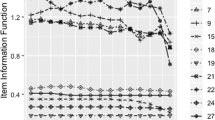Abstract
This exploratory field study examined Bandura's (1977) self-efficacy model to determine how well efficacy expectations predicted writing performance, and whether cognitive (deep processing) and affective (anxiety) variables were related to efficacy expectations. Other variables assessed with respect to efficacy and writing performance were race, sex, an English entrance exam (ACT) score, and locus of control. Subjects were college freshmen enrolled in introductory writing courses. The major findings were that (a) efficacy expectations predicted writing on phase 1 (beginning of writing course) data, but not phase 2 (end of course); (b) depth of processing, locus of control, and anxiety were related in varying degrees to amount of efficacy and to the accuracy of efficacy predictions of writing; (c) subjects significantly overestimated their writing performance, the discrepancy being even larger at phase 2. These results provide partial support for the construct validity of self-efficacy and suggest that cognitive and affective variables influence efficacy.
Similar content being viewed by others
References
Bandura, A. (1977). Self-efficacy: Toward a unifying theory of behavioral change.Psychological Review, 84 191–215.
Bandura, A., & Adams, N. (1977). Analysis of self-efficacy theory of behavioral change.Cognitive Therapy and Research, 1 297–304.
Campbell, D. T., & Stanley, J. (1963). Experimental and quasi-experimental designs for research on teaching. In N. L. Gage (Ed.),Handbook of research on teaching. Chicago: Rand McNally.
Chambliss, C., & Murray, E. (1979a). Cognitive procedures for smoking reduction: Symptom attribution versus efficacy attribution.Cognitive Therapy and Research, 3 91–95.ing. Chicago: Rand McNally.
Chambliss, C., & Murray, E. (1976). Efficacy attribution, locus of control, and weight loss.Cognitive Therapy and Research, 3 349–353.
Denman, M. (1975). I got this here hang-up: Non-cognitive processes for facilitating writing.College Composition and Communication, 26 305–309.
Denman, M. (1978). The measure of success in writing.College Composition and Communication, 29 42–46.
Einhorn, J. J., & Hogarth, R. M. (1978). Confidence in judgment: Persistence of the illusion of validity.Psychological Review, 85 395–416.
Goodman, A. (1976). Utilization of positive feedback in a classroom environment of acceptance to promote enhanced learned self-concept and improved written performance.Dissertation Abstracts International, 1976,36, 6550A.
Harmon, P. (1980). Holistic performance analysis: It's time for an updated technology of instruction.Educational Technology, 11 5–13.
Kazdin, A. E. (1979). Imagery elaboration and self-efficacy in the covert modeling treatment of unassertive behavior.Journal of Consulting and Clinical Psychology, 47(4), 725–733.
Kendall, P. C., & Korgeski, G. P. (1979). Assessment and cognitive-behavioral interventions.Cognitive Therapy and Research, 3 1–21.
Lalonde, B. D. (1980). The construction and validation of a measure of academic self-efficacy.Dissertation Abastracts International, 40 4510.
Maddux, J. E., Sherer, M., & Rogers, R. W. (1981). Self-efficacy expectancy and outcome expectancy: Their relationship and their effects on behavioral intentions.Cognitive Therapy and Research.
Oskamp, S. (1965). Overconfidence in case-study judgment.Journal of Consulting Psychology, 29 261–265.
Ribich, F. D., & Schmeck, R. R. (1981). Multivariate relationships between measures of learning style and memory.Journal of Research in Personality, 3 515–529.
Rimm, D., & Masters, J. (1979).Behavior therapy. New York: Academic Press.
Rinderer, R. (1979, April).Writing and psychology: Wedding the cognitive and the noncognitive. Paper presented at the College Conference on Composition and Communication Annual Convention, Minneapolis.
Rotter, J. B. (1966). Generalized expectancies for internal versus external control of reinforcement.Psychological Monographs, 80(1, Whole No. 609).
Schmeck, R. R. (1983). Learning styles of college students. In R. Dillon & R. R. Schmeck (Eds.),Individual differences in cognition. New York: Academic Press.
Schmeck, R., & Grove E. (1979). Academic achievement and individual differences in learning processes.Applied Psychological Measurement, 3 43–49.
Schmeck, R. R., & Ribich, F. D. (1978). Construct validation of the Inventory of Learning Processes.Applied Psychological Measurements, 2 551–562.
Schmeck, R., Ribich, R., & Ramanaiah, N. (1977). Development of a self-report inventory for assessing individual differences in learning processes.Applied Psychological Measurement, 1 413–431.
Spielberger, C. D., Gorsuch, R. L., & Lushene, R. (1970).State-Trait Anxiety Inventory Manual. Consulting Psychologists Press, Palo Alto, CA.
Author information
Authors and Affiliations
Rights and permissions
About this article
Cite this article
Meier, S., McCarthy, P.R. & Schmeck, R.R. Validity of self-efficacy as a predictor of writing performance. Cogn Ther Res 8, 107–120 (1984). https://doi.org/10.1007/BF01173038
Issue Date:
DOI: https://doi.org/10.1007/BF01173038




